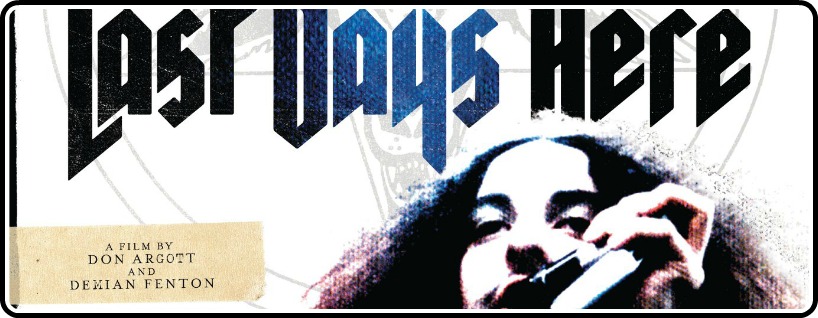
The 1970s band Pentagram was one of the pioneers of what is today known as Doom Metal, a blend of dark sludgy heavy metal, blues and boogie-woogie psychedelia. Like Black Sabbath, Pentagram and their frontman and vocalist Bobby Liebling sang of witchy evils and stylized satanic imagery. Yet unlike Sabbath they never got out of the underground, remaining active (yet dysfunctional) for the past 40 years. They formed in 1971 but didn’t release their debut album until 1985, after the revolving door of musicians and several breakups had already weakend any chance of widespread success. Recent years have brought a renewed interest in the band’s earliest demos and albums, saving Pentagram from total obscurity.
The driving force behind the band is Liebling, the only constant member and face of the band. “Last Days Here”, directed by Don Argott and Demian Fenton, best known for “Rock School” and “The Art of the Steal” begins with Liebling still living in his parent’s basement, an utter mess. Now in his mid-50’s, habitually smoking crack, and eating mostly bacon pizza, all his elderly parents can do is watch him waste away. Physically in need of an intervention, Liebling also has developed paranoid notions of parasites beneath his skin, causing him to scratch and pick his entire body raw. Much of the first third of the film shows him in very poor health (a large open crack running up his arm caused by excessive picking and scratching drew an audible audience recoil), and it is clear by his appearance that he needs to clean up or die.
The filmmakers and Liebling’s friend and new manager Sean “Pellet” Pelletier document his struggle to quit drugs and get Pentagram active and recording again. In many ways the film is reminiscent of “Anvil! The Story of Anvil” and the wonderful Roky Erickson documentary “You’re Gonna Miss Me”. But while Roky Erickson is a paranoid schitzophrenic, and Anvil are an average washed-up bar band, Liebling is a victim of immaturity. Sex, drugs and rock & roll is admittedly all he’s ever practiced, and he states that he’s never grown up, that he cannot care for himself. Yet regardless of his frizzy mess of gray hair, gauze-covered arms and a crack pipe always at the ready, Liebling comes across as funny, likable and self-deprecating. He knows his talent and he’s heard about it for years from his peers, famous musicians, and his poor parents who still defend him.
Sean Pelletier, an avid music collector and heavy metal fan discovered Pentagram and eventually tracked down Liebling. With an uncertain outcome ahead, Pelletier spends much of his time dragging him out of the mire and back onto a stage. The film is concurrently a rough history of the band, authentic (and also new, staged) 1970s footage and talking head interviews with past members. Just when it begins to feel like a stale Behind the Music episode with Liebling headed for certain death, a funny thing happens…romance. Bobby meets a young woman with a sharp fashion sense who is a fan of his music and “is attracted to funny looking men”. Reinvigorated and infatuated, Liebling quits his addictions cold turkey, begins dying his hair and moves into a big city apartment. As a new record contract looms his infatuation turns to obsession, leading him to turmoil, a relapse and a short jail stint.
Much time is spent with Pelletier and his struggles to balance his personal life and keeping Liebling in line. Both men are naturally warm-hearted and by the end of the film (and the real-life but predictable “will he or won’t he perform the big comeback show” finale), there’s a real tenderness between the two. Sadly, the film is a touch unclear about the band’s future and Liebling’s sobriety for the film to be as fulfilling as I would have liked. There was also less of Pentagram’s music featured than I was anticipating. We are told about their legendary influence, yet do not hear much. While we see Liebling singing, his vocals are often low in the mix and indistiguishable. Regardless, I walked into “Last Days Here” expecting a film with less warmth, humor and humanity, and that was a welcome surprise.


